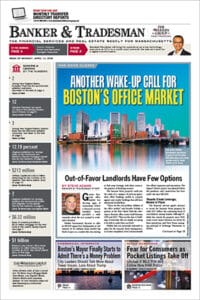
Mass Pike Towers, located at the corner of Tremont Street and Shawmut Avenue in Boston, was one of many so-called expiring use properties in Massachusetts in danger of being converted from affordable housing into market-rate rental units.
When the mortgage at Mass Pike Towers was ready to be paid off about a year ago, many residents worried their landlord would double or even triple their rents.
Built more than 20 years ago, as one of hundreds of “expiring use” apartment buildings across the state, Mass Pike Towers, located in Boston’s fashionable South End neighborhood, could have been converted from affordable apartments to more expensive market-rate housing.
That’s why the tenants were relieved when a real estate developer teamed up with a community group to make sure rents remained affordable for the apartments’ mostly Asian residents – many of whom were elderly.
With the help of state and city money, and after countless meetings with tenants, Boston developer Trinity Financial and South Cove Nursing Facilities Foundation – a housing and health care group – made it possible for residents to stay at Mass Pike Towers.
The apartments also underwent an $8 million revitalization project last spring, which featured the renovation of kitchen and bathrooms and the installation of new windows and heating and plumbing systems.
Residents recently celebrated the one-year anniversary of the renovation and preservation of the apartments. City and community leaders gathered to show their support of such projects.
Highlights of the $19.7 million project include an option written in the refinancing package that allows South Cove and the tenants to buy the building from investors after 15 years. The deal also includes deed restrictions that keep the property permanently affordable.
Such efforts are praised by housing advocates, who fear that some 20,000 so-called expiring use apartments – like Mass Pike Towers – are in danger of being converted into more expensive market-rate units. That could leave thousands of elderly and low- and moderate-income families homeless, activists say.
“It [Mass Pike Towers] has the critical ingredients for success – the partnership between the new owner, neighborhood and tenants, significant involvement from tenants and public resources to preserve the housing in the future,” said Aaron Gornstein, executive director of the Citizens’ Housing and Planning Association.
Two to three decades ago, property owners relying on Department of Housing and Urban Development mortgages, low-interest loans and other federal programs entered a contract agreeing to keep rents affordable for a certain time period.
Once the time period expires or if the mortgages are prepaid, the owners are free to convert the developments to market-rate rentals if they so choose.
In this case, Mass Pike Towers was backed by a HUD mortgage which was scheduled for prepayment, and the owners could have raised rents and converted the apartments to market-rate housing.
Rents, averaging between $500 and $800 a month, would have increased to anywhere from $1,800 to $3,000 a month, said James Keefe, principal and founder of Trinity Financial, the Boston real estate development firm that bought the apartments last spring.
Precious Stock
In the spring of 1999, Trinity officials started meeting with residents about their intentions to buy and renovate the building and quickly realized the need to get a community group involved, Keefe said.
Keefe said that as an Irish boy from Dorchester, he knew very little about the needs and concerns of the mostly Chinese residents of Mass Pike Towers.
“We felt we would be better off if we entered into a partnership agreement with a local organization that could really underscore our sincerity and reassure people that we didn’t want to do anything to harm their living situation,” he said.
Trinity eventually turned to South Cove Nursing Facilities Foundation, a group which provides long-term care, housing and other services to the elderly.
The foundation better understood the needs of people living in Chinatown, Keefe said.
“Affordable housing is such a precious stock in the community now,” said Helen Chin Schlichte, president of South Cove Nursing Facilities Foundation, which owns South Cove Manor Nursing Home.
Many residents at Mass Pike Towers work at South Cover Manor Nursing Home, located two blocks away, and are able to use their bilingual skills to serve the community, Schlichte said.
“If they lost their affordable housing, they probably would have had to find other jobs,” said Schlichte.
Eventually, residents formed the Mass Pike Towers Tenants Association, which became involved in the financing, design, construction and management of the property.
Developers got renewals of Section 8 subsidies for 40 residents, and helped 135 residents get similar assistance.
Keefe said that most of the residents who were not already getting federal housing assistance were using more than 30 percent of their income for rent.
“All these residents were still paying a disproportionate amount of their income on rent,” Keefe said.
The project was possible with tax-exempt bonds from the Massachusetts Finance Housing Agency, $5 million in equity from Lend Leased and other funding from Boston’s Department of Neighborhood Development and the Community Economic Development Assistance Corp.
“We don’t really see ourselves as owners of affordable housing,” Keefe said. “We really see ourselves as trustees or caretakers of important community resources like affordable housing.”
While it may be lucrative for property owners to convert affordable housing units to market-rate rentals, Keefe said it is “causing a lot of stress for a lot of vulnerable people.”
“We think there is a way to do these things, as long as you know the economic advantages are much more modest,” said Keefe. “But there’s a way you can do this and get paid for your services.”






